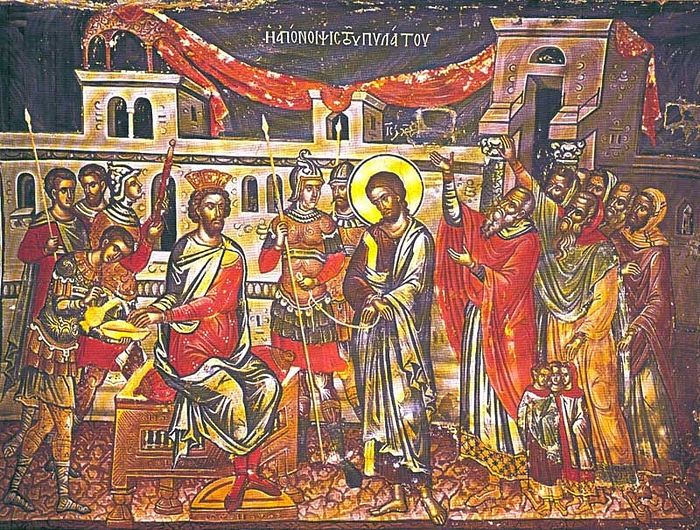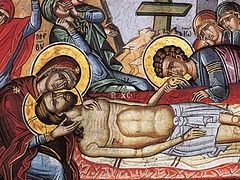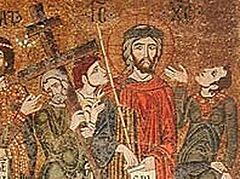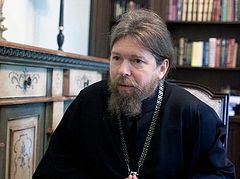Source: Orthodox Christian Network
April 12, 2016
So when Pilate saw that he was gaining nothing, but rather that a riot was beginning, he took water and washed his hands before the crowd, saying, “I am innocent of this man’s blood; see to it yourselves.” Matthew 27:24 (From the Fifth Gospel of Holy Thursday Evening) Tuesday of the Fifth Week of Lent
Pontius Pilate, depending on one’s perspective, is almost a “tragic” figure in the Passion of Christ. Because he wanted to do the right thing, he knew what the right thing was and he still couldn’t do it.
Pilate was the “prefect” of the Roman Province of Judea from 26-36 AD, during the reign of the Emperor Tiberius. Judea was not a glamorous assignment by any means. Far removed Rome, Pilate lived among Jews and Gentiles who resented Roman rule. The Romans, even though they had power, were outnumbered. Had the people gotten themselves organized, perhaps they could have overthrown their Roman overlords. So, Pilate’s grip on power was tenuous at best. He had to make alliances with the Jewish Temple leadership in an effort to “keep the peace” so he could keep his position.
Even though Pilate was known to have a ferocious temper, he also had a conscience and struggled with what to do when presented with the “case” of Jesus of Nazareth. In all four Gospel accounts, Pilate believes that Jesus is innocent. In the Gospel of Mark, Pilate openly questions the crowd in the Praetorium, “What evil has He done?” (Mark 15:14). In the Gospel of Luke, Pilate proclaims that Jesus is innocent not once but three times: A third time he said to them “Why, what evil has He done? I have found in him no crime deserving death; I will therefore chastise Him and release Him. (Luke 23:22). In the Gospel of John, Pilate says “See I am bringing Him out to you, that you may know that I find no crime in Him.” (John 19:4) And in the Gospel of Matthew, it was not only Pilate who had reservations, but his wife Claudia, who went to Pilate and said “Have nothing to do with that righteous man, for I have suffered much over Him today in a dream.” (Matthew 27:19)
With this amount of staggering sentiment recounted in ALL the Gospels about Pilate’s reservations about condemning Jesus, how could such a powerful man have gone against his own beliefs? Peer pressure, popularity and security are three compelling reasons, reasons that we all still fall prey to at times. First it was the chief priests claiming that Jesus forbid his followers to pay tribute to Caesar. (Luke 23:2). Then it was the crowed crying out “If you release this man, you are not Caesar’s friend; everyone who makes himself a king sets himself against Caesar.” (John 19:12) Pilate even tried to pacify the crowd by offering to release to them Jesus, or a murderer named Barabbas, hoping, and even believing, that the riotous crowd would most certainly not want a murderer released into their midst. And ultimately, Pilate “washed his hands” of the whole thing, as if to absolve himself of Jesus’ demise. Except that, had Pilate stood up and not allowed the crucifixion to proceed, it most certainly could not have. The betrayal, the chief priests, and the riotous crowd are all complicit in the death of Jesus. Pontius Pilate is complicit as well. Ultimately, his wife Claudia Procles was made a saint for her defense of Christ.
Pilate “washed his hands” and “passed the buck” because he feared the crowd. Perhaps he feared reprisals from the emperor. We don’t know if in the moment before he washed his hands, he “saw his life pass before him” and wondered what kind of life he would have if he were to be accused of betraying Caesar. So, he allowed the crucifixion to happen. Ironically, not even ten years after the crucifixion, Pilate fell out of favor with the emperor Caligula, was exiled to Gaul (France) and killed himself there.
Pontius Pilate offers two lessons to us: First, his question “What is truth?” is an existential question we should all seek answer to. Our life should be a pursuit of the “truth” of Christ. Somewhere in his mind, Pilate wanted to know the truth. Somewhere in his mind, he believed the words of his wife, that Jesus was a “righteous man.” And even as he washed his hands, he knew that he was doing wrong.
The more important lesson we learn from Pontius Pilate is that it is not only important to seek after and know truth, but to stand up for truth. And this is where Pilate fell short. And he fell short because of peer pressure, popularity and his desire for job security. Our unwillingness to stand up for the truth today is still affected by these things. In our lives, we have to have morals, truths and principles that we stand up for. If you had a well-paying job and you were asked to do something illegal to keep it, would you keep your morals or your money? If you were asked to slander someone else or lose popularity, would you tell a lie to keep your friends or tell the truth and risk losing them? These are hard questions. And while the answers are easy, the life application of them is hard.
The easy answer is that we do not take money or friends with us to our grave. Money can’t buy us a favorable judgment at the awesome judgment seat of Christ. And our friends won’t be there to stand with us. We will take the “truth” of our lives with us. The lies will be made known, the mistakes will be revealed. So, live in the truth, even if it costs you popularity or security. Because the “truth will make you (us) free” (John 8:32) and those who follow after Jesus as “the way, the truth and the life,” (John 14:6) will follow that truth into eternal life.
Come, O Christ-bearing people; let us see what Judas the traitor has plotted with the lawless priests against our Savior. Today, they condemned to death the Immortal Word. They delivered Him to Pilate, and crucified Him on the Place of the Skull; and as our Savior suffering these things, He cried out saying: “Father forgive them this sin, that the Gentiles may know of my Resurrection from the dead.” (From the 6th Hour on Good Friday, Trans. by Fr. George Papadeas)
Stop passing the buck and stand up for truth!





One of the closest "friends" I have (or had) is a staunch Protestant who seems to despise much of my Orthodox faith because we Orthodox believe and practice things that "aren't in the Bible." I have suffered much anguish over this man and his attitude, but during Great Lent this year, the Lord has reminded me that this man is NOT God and will not be my Judge when I leave this life. Better to have a friend in Jesus and the Saints, than to have one who discourages us from keeping our Faith, right?
Please pray for me as I struggle through the rest of Great Lent 2016!
Your servant,
Seraphim N., sinner